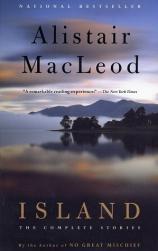Reading Group Guide
Discussion Questions
Island: The Complete Stories

1. The characters in Island share a great degree of pride in their heritage and their homeland. How do the stories convey their pride in their lives, their professions, their heritage, their landscape, and their families? Do they also experience joy and happiness?
2. The stories are characterized by thematic and stylistic paradoxes such as myth vs. reality, remoteness vs. nearness, destiny vs. free will, reality vs. romance, and the strange vs. the familiar. How is each of these paradoxes manifested in the stories? Does MacLeod reconcile these paradoxes? Do you detect other thematic or stylistic paradoxes in the stories?
3. In "The Return" the grandmother tells her grandson, "It is not that easy to change what is a part of you" [p. 92]; in "As Birds Bring Forth the Sun" the son realizes, "You cannot not know what you do know" [p. 320]; and in "Clearances" the old man muses to his dog about the life that each of them is currently leading, "Neither of us was born for this" [p. 430]. How do each of these statements convey the theme of fate in Island ? How do the characters cope with their sense of destiny?
4. What is the significance of MacLeod's frequent use of relationships to identify his characters (e.g., fathers, sons, mothers, grandfathers, etc.) and his spare use of his characters' given names?
5. The majority of the stories are told in the first person by a male narrator. What is the effect of this style on the reader's perception of the events? How is the narrator both an active participant and an outside observer of these events? Does the "narrator" ever judge? Is it MacLeod's voice that the reader hears?
6. Does the description "entombed feelings" ["The Closing Down of Summer," p. 197] describe the feelings of many characters in Island ? How are emotions expressed in Island ? Does the physical landscape reflect the emotional isolation of the characters, or does it cause their isolation? Why might have MacLeod selected the word island for the title?
7. MacLeod compares "ivory white gulls" to "overconditioned he-men" in "The Lost Salt Gift of Blood" [p. 119], a ship that can save a drowning man to Santa Claus in "To Every Thing There Is a Season" [p. 210], and a memory to a scar in "Vision" [pp. 321-2]. How do these and other examples of MacLeod's original and often elaborate metaphors reinforce the themes of the stories in which they appear?
8. How do the earlier stories differ from the later stories in theme, tone, and style? Have the characters evolved?
9. The descriptions of the animals' life cycles in "Second Spring" conveys most directly the notion running through Island that the path of life is not linear but cyclical, and, moreover, that existence is not constrained to one person's lifetime but rather follows a continuum from one generation to the next. The narrator in "The Closing Down of Summer" muses, "Perhaps we are but becoming our previous generation" [p. 193]. Does this view of life give comfort, or is it stifling? Can one break out of this cycle? How does MacLeod's narrative style and method, particularly in "Winter Dog" and "Clearances," reinforce the theme of the intertwining of lives?
10. How is religion distinguished from superstition in the lives of the characters in Island ? What role does each play? Is it religion or something else that provides a moral code of behavior for the inhabitants of Cape Breton?
11. Despite their portrayal of a way of life probably foreign to many readers, on what level are the stories universally familiar? To which elements can the reader most readily relate?
Island: The Complete Stories
- Publication Date: March 12, 2002
- Genres: Short Stories
- Paperback: 448 pages
- Publisher: Vintage
- ISBN-10: 0375713042
- ISBN-13: 9780375713040






